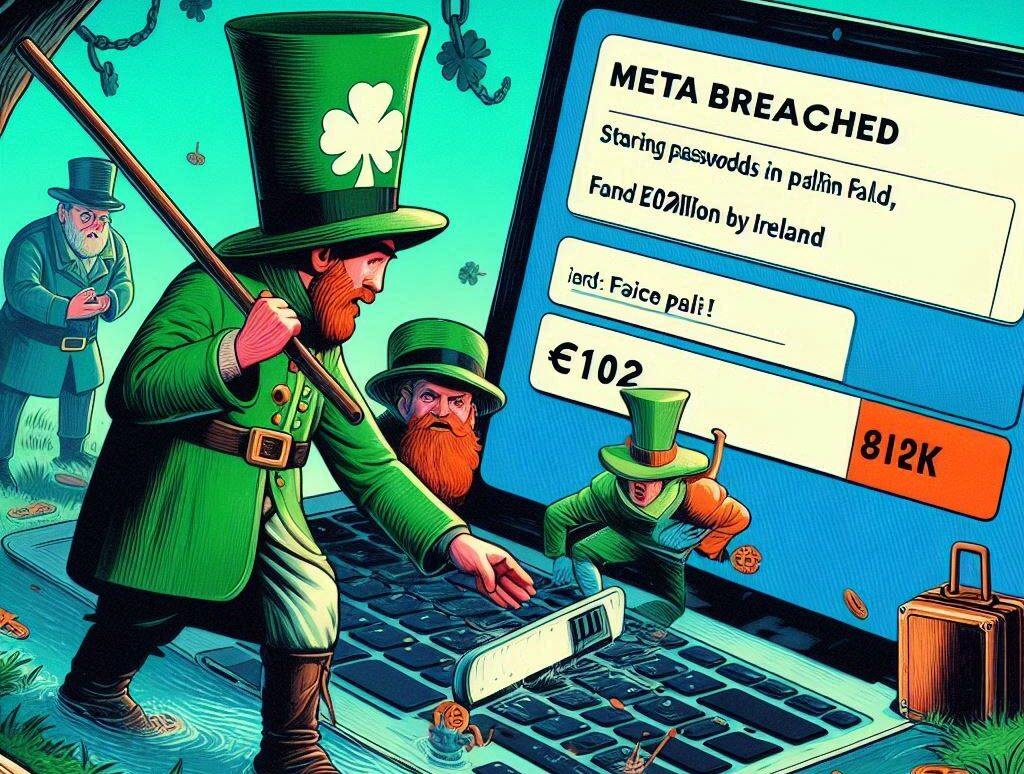Meta Breached: Storing Passwords in Plaintext, Fined €102 million by Ireland

In a major blow to Meta, the parent company of Facebook and Instagram, the Irish Data Protection Commission (DPC) has levied a $101 million (€102 million) fine for inadequate password security measures, which exposed sensitive user information. The fine, while relatively small compared to Meta’s revenue, highlights growing regulatory scrutiny on tech giants as the European Union tightens data privacy enforcement.
The investigation was triggered in April 2019 when Meta reported to the DPC that it had accidentally stored millions of user passwords in plain text on internal systems. This breach, which occurred in January 2019, affected 36 million Facebook and Instagram users across the European Economic Area, including EU nations, Iceland, Liechtenstein, and Norway.
The Dangers of Storing Passwords in Plaintext
Storing passwords in plaintext is one of the most glaring security vulnerabilities in any system. In Meta’s case, it meant that anyone with access to their internal systems—whether authorized or through a security breach—could easily view and potentially misuse the passwords of millions of users.
Graham Doyle, head of communications at the DPC, emphasized the severity of this error: “It’s a well-established principle that user passwords should never be stored in plaintext, given the potential risks of misuse if unauthorized persons gain access to the data.”
Meta acknowledged the error, noting that while the passwords were temporarily stored in a readable format, there is no evidence they were misused or improperly accessed. The company also stressed its full cooperation with the DPC during the investigation.
A Wake-Up Call for the Tech Industry
Meta’s breach is not an isolated incident; it’s part of a broader trend of security lapses across tech companies. As tech giants like Meta, Google, and Apple grow, they manage increasingly vast amounts of user data, making them prime targets for cyberattacks. This raises questions about how secure these massive data troves really are, and whether existing security measures are adequate.
With regulators across Europe taking a stronger stance on data security and privacy, companies are being forced to reevaluate their security models. Fines like the one imposed on Meta signal the growing risks for companies that fail to take adequate precautions.
The Zerocrat Advantage: Zero-Knowledge Security
In light of such breaches, the need for robust security models that prevent unauthorized access to sensitive information is clear. This is where Zerocrat, a privacy-focused accounting solution, sets a new standard. Unlike many traditional platforms, Zerocrat implements a zero-knowledge security model, which ensures that even the platform itself cannot access users’ sensitive information, such as passwords and personal data.
By using advanced encryption techniques like AES-256 bit encryption and PBKDF2 key generation, Zerocrat guarantees that no data is stored in plaintext. This means even in the event of a breach, sensitive information remains protected, as it is stored in an unreadable format.
Additionally, Zerocrat’s end-to-end encryption and commitment to user privacy ensures that data is secure from both internal and external threats. In contrast to Meta’s mistake of storing passwords in plain text, Zerocrat uses cryptographic algorithms that make unauthorized access nearly impossible, creating an impenetrable barrier to cybercriminals.
A New Era of Accountability
Meta’s fine is a reminder that companies can no longer afford to be lax in their data security practices. As regulatory scrutiny intensifies, the importance of robust, adaptive security systems will only grow. Platforms like Zerocrat, which prioritize security and privacy from the ground up, represent the future of data protection in an increasingly hostile cyber environment.
With privacy at its core, Zerocrat offers businesses and individuals a reliable solution in a world where data breaches and cyberattacks are becoming all too common. As the tech industry faces mounting pressure to improve security, adopting models like Zerocrat’s zero-knowledge architecture will be essential to safeguarding sensitive information and restoring trust in digital platforms.
